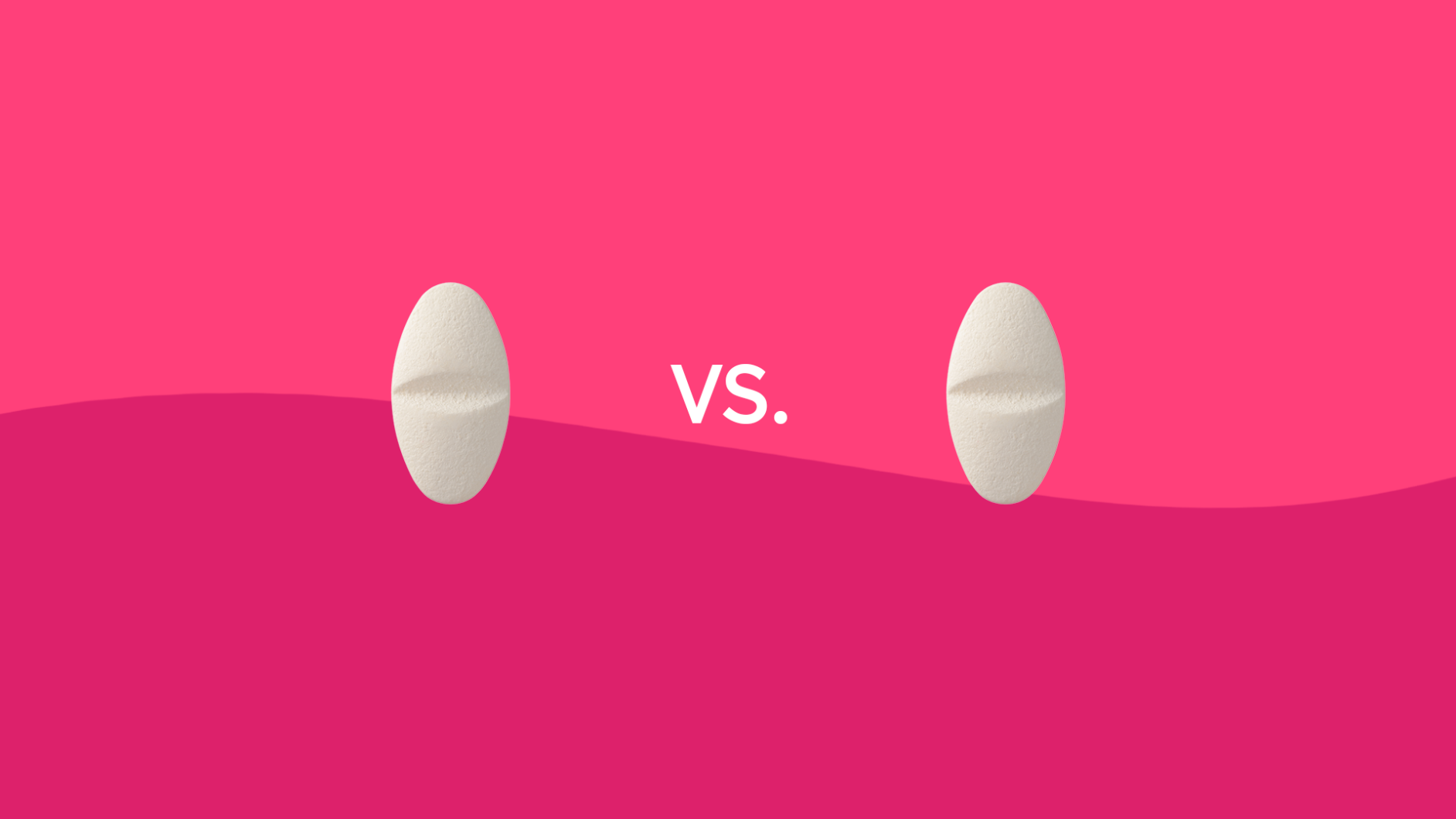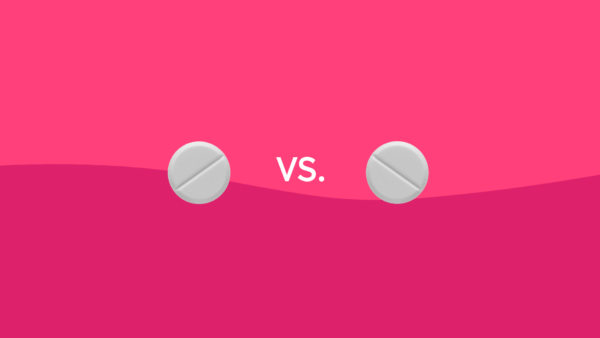Drug overview & main differences | Conditions treated | Efficacy | Insurance coverage and cost comparison | Side effects | Drug interactions | Warnings | FAQ
If you are one of the 50 million Americans that suffer from allergies each year, you may have taken a walk down the allergy aisle at your local pharmacy. There are so many options it is difficult to know which medication to choose.
Allegra and Zyrtec are two medications indicated for the treatment of allergies. Both drugs are available in brand and generic and can be purchased over-the-counter (OTC). They are classified in a group of medications called H1 antagonists, or H1 blockers, and they are also known as non-sedating antihistamines. They work by blocking the effects of histamine. Histamine is a chemical made by your immune system in response to allergens. It causes allergy symptoms, such as runny nose, sneezing, and watery, itchy eyes. By blocking histamine, these drugs help relieve allergy symptoms.
Older drugs like Benadryl (diphenhydramine) are known as first-generation antihistamines and cause more drowsiness. Allegra and Zyrtec are known as second-generation antihistamines and are classified as non-sedating antihistamines. Although they still may cause drowsiness, they cause less drowsiness than first-generation drugs. Both medications are known as antihistamines, and although they are very similar, they do have some differences.
What are the main differences between Allegra and Zyrtec?
Allegra (fexofenadine) and Zyrtec (cetirizine) are both antihistamines that are available OTC in brand-name and generic form. Both are available in a variety of formats for dosing preference, such as tablet and liquid form. Allegra and Zyrtec are both used in adults and children. The typical adult dose of Allegra is 180 mg daily as needed, or 60 mg twice daily as needed. The typical adult dose of Zyrtec is 5 to 10 mg daily as needed.
| Main differences between Allegra and Zyrtec | ||
|---|---|---|
| Allegra | Zyrtec | |
| Drug class | H1 blocker (antihistamine) | H1 blocker (antihistamine) |
| Brand/generic status | Brand and generic | Brand and generic |
| What is the generic name? | Fexofenadine | Cetirizine |
| What forms does the drug come in? | Tablet Gelcap Oral suspension Also available in combination with pseudoephedrine, a decongestant |
Tablet Liquigel Chewable tablet Oral solution Also available in combination with pseudoephedrine, a decongestant |
| What is the standard dosage? | Adults: 180 mg daily as needed or 60 mg twice daily as needed Children: varies by age |
Adults: 5 to 10 mg daily as needed Children: varies by age |
| How long is the typical treatment? | Short-term/seasonally as needed | Short-term/seasonally as needed |
| Who typically uses the medication? | Adults; children 2 years and older | Adults; children 6 months and older |
Conditions treated by Allegra and Zyrtec
Allegra and Zyrtec are both used to treat seasonal allergy symptoms. Allegra (What is Allegra?) is indicated in adults and children 6 years and older, and Zyrtec (What is Zyrtex?) is indicated in adults and children 2 years and older. Both drugs are also indicated for the treatment of hives (urticaria), but for different ages (see chart below). Zyrtec is also indicated for the treatment of perennial allergy symptoms in children 6 months and older. Perennial allergies can occur at any time of year and are related to dust and mold. Check with your doctor about appropriate dosing in children.
| Condition | Allegra | Zyrtec |
| Relief of seasonal allergic rhinitis symptoms in adults and children | Yes. Adults and children 6 years and older | Yes. Adults and children 6 years and older |
| Treatment of uncomplicated skin manifestations of chronic idiopathic urticaria in adults and children | Yes. Adults and children 6 years and older | Yes. Adults and children 6 years and older |
| Relief of perennial allergic rhinitis symptoms (due to allergens such as dust mites, animal dander, and molds) in adults and children 6 months and older | Off-label | Yes |
Is Allegra or Zyrtec more effective?
A study looked at 495 patients with seasonal allergies and compared Allegra 180 mg daily to Zyrtec 10 mg daily for two weeks. Both drugs were found to be equally effective in treating allergy symptoms, and Allegra was found to cause less drowsiness than Zyrtec.
Another study showed that Zyrtec was more effective than Allegra, and that side effects were similar.
Some people have a preference for one over the other, though, so it may take some trial and error to determine which drug is more effective for you. Also, your doctor can help you choose which drug may be more appropriate for you.
Coverage and cost comparison of Allegra vs. Zyrtec
Allegra and Zyrtec are both available OTC in brand and generic, in a variety of dosing formats such as tablets and liquid. They are not typically covered by insurance, because they are OTC, however, some government plans (such as state Medicaid) may pay for Allegra or Zyrtec with a doctor’s prescription. A typical Allegra purchase of #30, 180 mg tablets can cost about $23, but you can get the generic form, fexofenadine, for about $12 with a SingleCare coupon. Similarly, a typical Zyrtec purchase of #30, 10 mg tablets would normally cost about $20-30 but costs as low as $5 with SingleCare, if prescribed by a doctor.
| Allegra | Zyrtec | |
| Typically covered by insurance? | No | No |
| Typically covered by Medicare Part D? | No | No |
| Standard dosage | #30, 180 mg tablets | #30, 10 mg tablets |
| Typical Medicare copay | N/A | N/A |
| SingleCare cost | $12 | $5 |
Common side effects of Allegra vs. Zyrtec
Allegra and Zyrtec are well tolerated by most patients. The most common side effect of Zyrtec is drowsiness. Other side effects that may occur include fatigue, dry mouth, and upper respiratory infection. The most common side effect of Allegra is headache, followed by upper respiratory tract infection, back pain, fatigue, drowsiness, and nausea.
Other side effects may occur. Consult your allergist or other healthcare professional for a full list of side effects.
| Allegra | Zyrtec | |||
| Side Effect | Applicable? | Frequency | Applicable? | Frequency |
| Headache | Yes | 10.6% | No | — |
| Upper respiratory tract infection |
Yes | 3.2% | Yes | 2% |
| Back pain | Yes | 2.8% | Yes | Not reported |
| Fatigue | Yes | 1.3% | Yes | 5.9% |
| Dry mouth | No | — | Yes | 5% |
| Drowsiness | Yes | 1.3% | Yes | 11-14% |
| Nausea | Yes | 1.6% | Yes | Not reported |
Source: FDA Label (Allegra), FDA Label (Zyrtec)
Drug interactions of Allegra vs. Zyrtec
Allegra has very few drug interactions. When taken with erythromycin or ketoconazole, there is an interaction that can result in a buildup of Allegra in the body, which could mean more side effects. Allegra also interacts with antacids, resulting in decreased amounts (and decreased effectiveness) of Allegra in the body.
Zyrtec interacts with other drugs that cause drowsiness, such as painkillers, antidepressants, or medications used for anxiety or sleep, as well as alcohol or marijuana (cannabis).
Consult your healthcare professional for a full list of drug interactions.
| Drug | Drug Class | Allegra | Zyrtec |
| Erythromycin | Macrolide antibiotic | Yes | No |
| Nizoral (ketoconazole) | Azole antifungal | Yes | No |
| Maalox Mylanta Rolaids |
Antacids | Yes | No |
| Alcohol Opioid painkillers Antidepressants Anti-anxiety medications Insomnia medications Cannabis |
Drugs that cause drowsiness | Not recorded, but potentially | Yes |
Warnings of Allegra and Zyrtec
Allegra is a pregnancy category C, and Zyrtec is a pregnancy category B. Because the drugs have not been studied enough in pregnant women, be sure to consult your doctor before using Allegra or Zyrtec if you are pregnant.
Patients who are 65 or older and/or have kidney problems should consult a doctor before using Allegra or Zyrtec.
Grapefruit or grapefruit juice can interact with certain medications. Allegra can not only interact with grapefruit juice but orange or apple juice. These fruit juices lower the amount of Allegra in your body, making the drug less effective. It is important to take Allegra with water.
When taking Zyrtec use caution when driving or operating machinery. Avoid using Zyrtec with alcohol, marijuana, or other medications that cause sedation, because the combination can worsen CNS impairment.
Frequently asked questions about Allegra vs. Zyrtec
What is Allegra?
Allegra, also known by its generic name fexofenadine, is an antihistamine used in the treatment of allergies.
What is Zyrtec?
Zyrtec is an antihistamine used to treat allergies. The generic name of Zyrtec is cetirizine.
Are Allegra and Zyrtec the same?
No. While both drugs are antihistamines, they have some differences such as side effects, drug interactions, and warnings (outlined above). Other popular antihistamines you may have heard of include Benadryl (diphenhydramine), Claritin (loratadine), and Xyzal (levocetirizine).
Is Allegra or Zyrtec better?
Studies show both drugs to be better than placebo and various evidence shows that Allegra and Zyrtec are equally effective, or that Zyrtec may be slightly better. However, side effects vary as well and should be taken into consideration when selecting an allergy medication.
Can I use Allegra or Zyrtec while pregnant?
Consult your doctor about the use of Allegra or Zyrtec during pregnancy. If you are already taking Allegra or Zyrtec and find out that you are pregnant, consult your doctor.
Can I use Allegra or Zyrtec with alcohol?
Alcohol can increase the side effects of Allegra or Zyrtec, such as dizziness, drowsiness, or impairment. It is recommended to avoid alcohol while taking Allegra or Zyrtec.
Can I take Zyrtec and Allegra together?
Combining allergy medications is not always a good idea. Unless your doctor tells you otherwise, it is best to pick one appropriate allergy medication and take it as directed.
Which antihistamine is best?
That depends. Some patients swear by Allegra, while others love Zyrtec. Other non-sedating antihistamines such as Claritin and Xyzal are very popular, too. It may take a bit of trial and error to find which antihistamine helps your symptoms the most while giving you the least side effects.
Does Zyrtec raise blood pressure?
Zyrtec alone does not raise blood pressure, however, Zyrtec-D (and its generic) contains pseudoephedrine, which can raise blood pressure. Ask your pharmacist if you need help selecting an antihistamine product that does not contain a decongestant.
Is it better to take Zyrtec at night or in the morning?
One dose of Zyrtec will last for 24 hours, so you can take it any time of day that works for you. If you find that Zyrtec causes you to feel drowsy, you may want to try taking it at bedtime.
What are the long term effects of taking Zyrtec?
The Zyrtec labeling information does not contain information on long-term use. Consult your doctor for more information.





